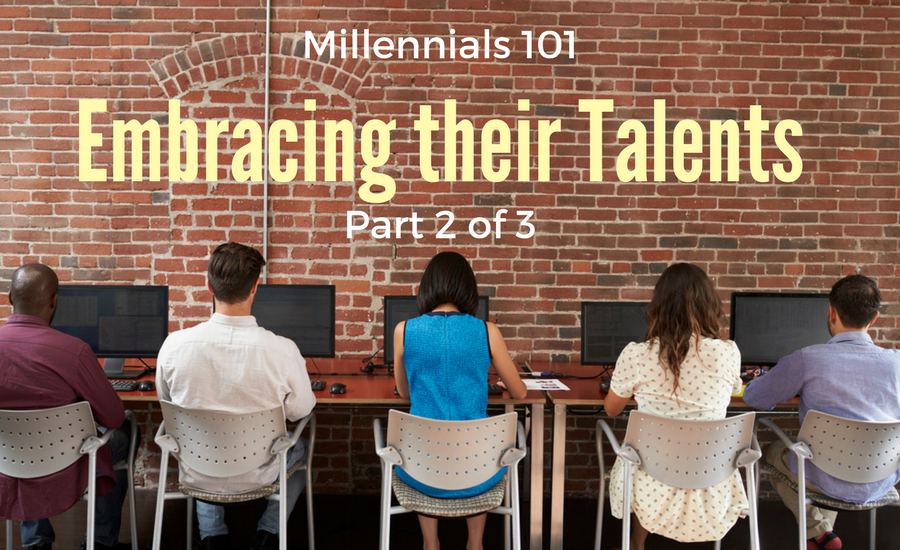Editor's Note: Managing and working with millennials is a major topic of conversation in the restoration industry today. Some people are sick of talking and hearing about it; others cannot get enough. The truth is there is a whole generation of young restorers now coming of age, moving into ownership positions, and eager to take the restoration industry forward to a new era. But first, we all have to learn to get along.
This is the second of a three-part series in answer to the many questions I have been hearing from business owners as to the best way to successfully manage the younger generation of millennials when it feels like nothing is working. My intention here is to see if we can find a win-win for everyone, as my experience has always been that if your employees can thrive in their place of work, productivity goes way up, and the business is very profitable.
Why is this so important, and why is this becoming such a common concern? It's simple: millennials, the generation born between 1980 and 2000, are now entering employment in vast numbers, and will shape the workplace for years to come. Attracting and understanding the best of these millennial workers is critical to the future of your business. Their career aspirations, attitudes about work, and knowledge of new technologies will define the culture of the 21st century workplace. Millennials matter because they are not only different from those that have gone before, they are also more numerous than any since the soon-to-retire baby boomer generation – millennials already form 25 percent of the workforce in the U.S. and account for more than half of the population in India. By 2020, millennials will be half of the global workforce. And, what we are facing is the additional challenge of a growing workforce with strikingly different values trying to integrate with the values of previous generations.
Let’s look at the top four talents of this new generation of individuals, and some of the common misunderstandings that lead to problems in way they are being managed. Plus, we must simultaneously clarify how each talent or characteristic might contribute to a more successful way of managing this younger generation.
The pace of how fast the world is changing requires new ways of thinking and adapting in the way we run business and manage people today. Being up to date with this can make the difference between working hard and working smart.
Community...
Because Millennials want to weave work life into personal life, they also desire a strong sense of community. One way of doing that is to create programs that ensure them that “we’re all in this together”. One really great way an east coast company I worked with did that is they formed a weekly book study group. Everyone was invited to attend the weekly group that met at lunch time to study a chapter of various books like Good to Great, and a few other popular books on business management. That was hugely successful because this generation is first and foremost committed to their personal learning and development as their first choice benefit from employers, and they love the experience of a community learning together. In addition, they want to feel their work is worthwhile, is making a difference for their peers, and their communities, and for the world. And they need to feel and see the evidence of that, and hear acknowledgements that their efforts are being recognized by their employers. Where previous generations value profit above all else, this generation places the needs of the business to be profitable equally and sometimes even less than these top 4 values.
Transparency…
They want to be included in the “why” of big decisions. They want to know the outcomes needed and the reasons driving the need for those. When they feel your trust and respect, you will gain their trust and loyalty. When you can provide transparency on the inner workings of company decisions, do it. If not, explain why you can’t and give all of the details.
Millennials are a generation whose parents always answered them when they asked “Why?” As the Netflix culture deck says on slide #76, if you want to build a ship, don’t hire people to gather wood, then divide up the work and give them orders; instead teach them to yearn for the vastness of the open sea. That means once they get the full reason and context for what there is to accomplish, they will own and drive the whole project, and from what I have seen, there is no limit to both their passions for this and how far you can take it.
Ultimately, they will be happy to be the driving force of your business, with the safety and security of a steady paycheck. That’s a win -win for everyone, if you can give them the information and resources they need. Where this breaks down is when owners aren’t comfortable sharing financial information key employees need to know to perform at a level some are not traditionally used to.
Flexibility…
Millennials tend to be uncomfortable with rigid corporate structures and turned off by information silos. They expect rapid progression based on accomplishments, and a varied and interesting career and constant feedback.
In other words, Millennials want a management style and corporate culture that is markedly different from anything that has gone before. They want a fast-paced, progressive, and challenging environment offering opportunities for accomplishment and feedback. Their ambition and desire to keep learning and move quickly upwards through an organization, as well as their willingness to move on quickly if their expectations are not being met, is particularly challenging for owners or senior managers of an older generation used to a business culture that’s slower, safer, methodical, and predictable.
Can this be profitable and successful for your business? Absolutely, if you can let go of some of the more traditional control forms of management and keep up with the pace they like to set. They will embrace the risk and challenge that comes with the additional responsibility, accountability, and flexibility. This can lead to the entire concept of work becoming more flexible. The skills needed in the workforce are going to be less about IQ and more about EQ, because if you think about it, a lot of IQ knowledge is immediately available through hand-held devices, the computer, and technologies that we have at our fingertips.
Technology…
Millennials’ use of technology clearly sets them apart. One of the defining characteristics of the millennial generation is their affinity with the digital world. They have grown up with broadband, smartphones, laptops and social media being the norm and expect instant access to information. This is the first generation to enter the workplace with a better grasp of key business tools. Some Millennials don’t even remember a time before cell phones. Most of them have a smartphone, whether they need it for work or not. They are a generation that is used to having access to the tools, which allow them to be flexible in their work.
Here’s how to stifle a millennial’s best work: put them in a cube and expect them to sit there from 9-5 Monday through Friday to do their jobs with low level technology.
Another interesting aspect of this techno generation is their avoidance of face time. With technology dominating every aspect of millennials' lives, it’s perhaps not surprising that 41 percent say they prefer to communicate electronically at work than face-to-face or even over the telephone. Millennials routinely make use of their own technology at work and three-quarters believe that access to technology makes them more effective at work.
Bottom Line...
Allow millennials to work in teams of various numbers, have all the resources they need to get their job done including information and technology, be flexible in your management style by letting go of ways that control the process of work, and stay focused on the outcomes needed.
Then stand back and watch their productivity and your profits go up.




Report Abusive Comment